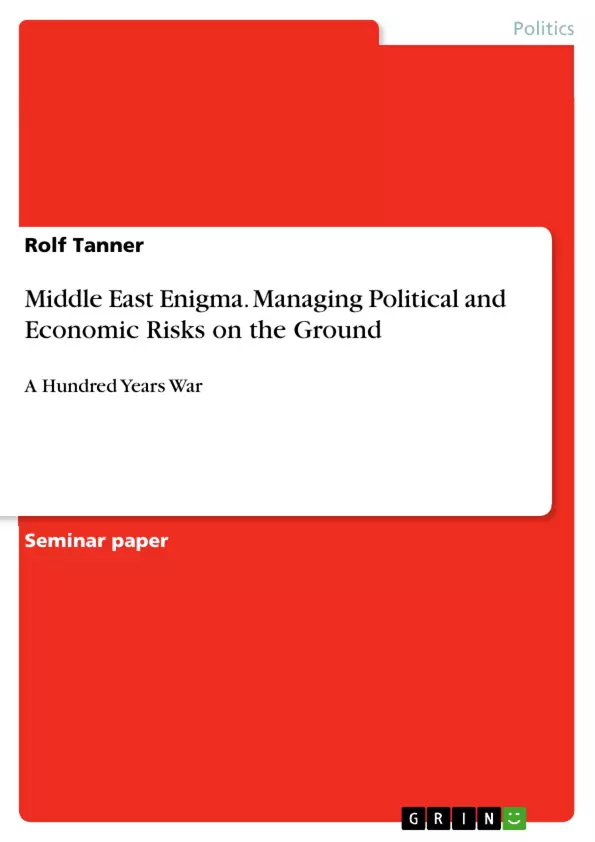The Middle East remains one of the planet’s major conflict arenas. It is among the highest military spenders. While global defence expenditures have been declining or only notching up slightly over the last three years, they have continued to grow by more than 10 % in the Middle East. Among the 15 countries with the highest defence expenditures in relations to GDP, more than half are from the Middle East.
The text gives an overview about the historical and structural developments of the current conflict landscape in the Middle East and then focuses on the ascent of ISIS as an example of these developments at work.
It closes with an Outlook about how the Middle East might look like after the demise of ISIS.
Inhaltsverzeichnis (Table of Contents)
- The Hundred Year's War
- How it all began
- Landmark events in the making of today's Middle East
Zielsetzung und Themenschwerpunkte (Objectives and Key Themes)
This presentation aims to provide an historical analysis of the Middle East, focusing on the roots of the region's conflicts and instabilities. It explores the key events and dynamics that have shaped the Middle East over the past century, highlighting the region's complex geopolitical and geo-economic landscape.
- The role of historical events in shaping the Middle East's current state
- The impact of colonial interests and power struggles on the region
- The significance of oil and gas reserves in the Middle East's geo-economic relevance
- The complex relationship between political risk and global energy security
- The enduring impact of the Arab-Israeli conflict on the region's dynamics
Zusammenfassung der Kapitel (Chapter Summaries)
The presentation begins with a fable illustrating the perceived irrationality and violence in the Middle East. It then delves into the region's high military spending and its presence among the top failed states, highlighting the paradox of significant military expenditures alongside weak state institutions.
The presentation argues that the Middle East's current state can be understood as a "hundred years' war," with its roots in a series of events that began around a century ago. These events include the Anglo-Russian division of Persia, the discovery of oil in Abadan, the First World War, and the Sykes-Picot Agreement.
The presentation further discusses the significance of the Balfour Declaration and the Cairo conference, which attempted to resolve the complex post-war situation. It then highlights key landmark events in the region's history, including the foundation of Israel, the Six Day War, and the Iranian Revolution.
Schlüsselwörter (Keywords)
The presentation focuses on key themes and concepts such as the Middle East's conflicts, political and economic risks, historical genesis, colonial influence, geo-economic relevance, oil and gas reserves, the Arab-Israeli conflict, and landmark events shaping the region.
Frequently Asked Questions
Why is the Middle East conflict often called a "Hundred Years' War"?
The presentation argues that current instabilities have roots in a series of events starting a century ago, including the First World War and the Sykes-Picot Agreement.
What was the impact of the Sykes-Picot Agreement on the region?
The Sykes-Picot Agreement led to the colonial division of the Middle East between Britain and France, creating artificial borders that contribute to ongoing conflicts.
How significant is military spending in the Middle East?
The Middle East has some of the highest military expenditures globally relative to GDP, with spending continuing to grow even as global trends decline.
What role does oil play in the region's geopolitical risks?
The discovery of oil (e.g., in Abadan) made the region central to global energy security, intertwining local political risks with international economic interests.
What landmark events shaped the modern Middle East?
Key events include the Balfour Declaration, the foundation of Israel, the Six Day War, the Iranian Revolution, and more recently, the rise of ISIS.
- Arbeit zitieren
- Dr. phil. hist. Rolf Tanner (Autor:in), 2015, Middle East Enigma. Managing Political and Economic Risks on the Ground, München, GRIN Verlag, https://www.grin.com/document/295676



